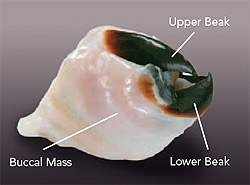Advanced Platform Technology Center
Bio-inspired Materials for New Prosthetic Liners
Although prosthetic limbs have undergone some remarkable advances in the last decade the weak link remains how artificial extremities are connected to the user’s body. Low-tech straps, cuffs or sockets hold high-tech limbs in place, sometimes imperfectly. Attaching hard metal or plastic prosthetic components to the soft, vulnerable skin and muscle of the residual arm or leg is a recipe for discomfort, or worse, further injury and tissue damage. Our goal is to improve the interface between a veteran amputee and their prosthetic limb by developing a new material for prosthetic liners inspired by the ‘shock absorber’ function of a squid beak.
 A squid’s beak is as hard and sharp as a razor blade embedded in soft tissue the consistency of Jell-O. The beak doesn’t carve itself loose from the soft body of the squid, but becomes gradually less stiff and more supple from tip to base. The animal creates this natural damping mechanism, called a mechanical gradient, by subtly tweaking the mix of the beak’s chemical ingredients.
A squid’s beak is as hard and sharp as a razor blade embedded in soft tissue the consistency of Jell-O. The beak doesn’t carve itself loose from the soft body of the squid, but becomes gradually less stiff and more supple from tip to base. The animal creates this natural damping mechanism, called a mechanical gradient, by subtly tweaking the mix of the beak’s chemical ingredients.
The prototype material the APT Center team has formulated so far doesn’t yet have the stiffness range of its natural counterpart. Its hardest area is five times that of its softest, while the tip of the squid’s beak is 100 times harder than its base. The investigators are confident that they can ramp up the mechanical gradient and produce a new material that will revolutionize prosthetic suspensions and greatly improve device comfort, usability and safety.
Principal Investigators: Jeffrey R. Capadona, Ph.D. • Paul D. Marasco, Ph.D. • Stuart Rowan, Ph.D.
Funding Agency: Veterans’ Affairs APT Innovation Incentive Grant FY2013




















